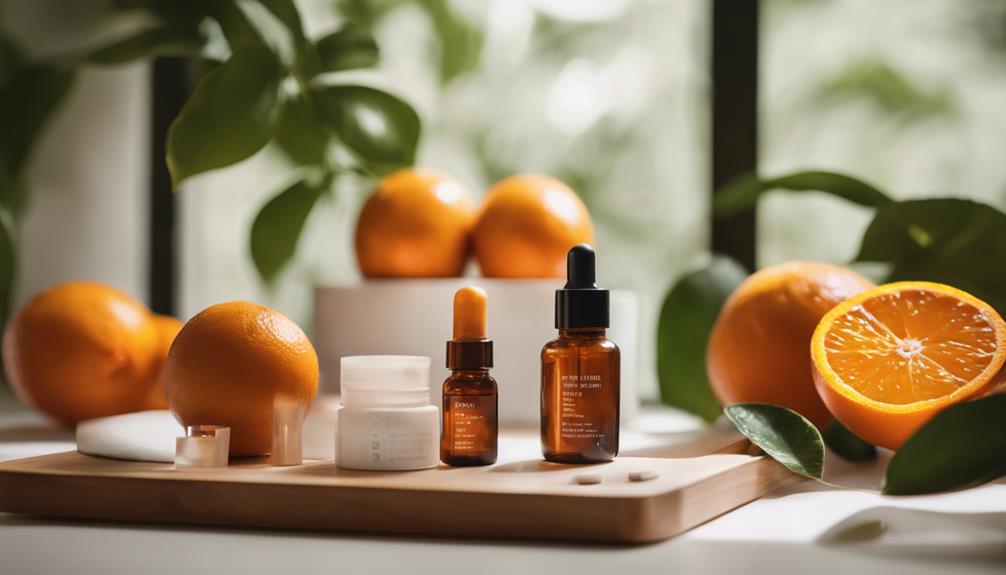You should incorporate Vitamin C into your skincare regimen mainly in the morning. Apply it on clean, dry skin immediately after cleansing and toning to enhance absorption. A concentration between 10% and 20% is ideal for most skin types. Layer it under moisturizer and sunscreen for added protection against UV damage. If you have sensitive skin, consider starting with nighttime application to reduce irritation. Consistency is key; consistent use improves brightness and diminishes dark spots over time. Stay tuned to learn more about selecting the right serum and ensuring its effectiveness!
Key Takeaways
- Apply Vitamin C on clean, dry skin, ideally after cleansing and toning for optimal absorption.
- Morning application is recommended for antioxidant protection against UV damage throughout the day.
- Use a concentration between 10% to 20% for maximum effectiveness, adjusting for sensitive skin if needed.
- Choose stabilized forms of Vitamin C in dark, airtight packaging to preserve potency and prevent oxidation.
Types of Vitamin C
Vitamin C comes in various forms, each offering unique benefits for your skincare routine. One of the most studied and effective options is L-ascorbic acid (LAA). While it delivers excellent results, it's essential to recognize that it's water-soluble and unstable, which can limit its effectiveness over time.
If you're looking for a more stable alternative, Tetrahexyldecyl ascorbate is an oil-soluble form that penetrates deeper into the skin, providing lasting benefits without compromising stability.
For those with sensitive skin, Magnesium Ascorbyl Phosphate (MAP) is your best bet. This stable, water-soluble derivative offers effective results without causing irritation, making it perfect for delicate complexions. Another option, Sodium Ascorbyl Phosphate, is also stable and works wonders for brightening the skin while reducing inflammation.
When choosing a Vitamin C product, pay attention to the vitamin C concentration. Aim for a range between 10% to 20% for peak effectiveness.
Benefits of Vitamin C

Incorporating Vitamin C into your skincare routine brings a wealth of benefits that can transform your complexion and boost overall skin health.
One of the key benefits of Vitamin C is its ability to stimulate collagen production, which enhances skin elasticity and firmness, giving you a more youthful appearance. Regular use of Vitamin C can greatly reduce dark spots and hyperpigmentation, leading to a more even skin tone and brighter complexion.
The anti-inflammatory properties of Vitamin C are particularly advantageous for those with sensitive skin, as it helps soothe irritated areas and reduce redness. By protecting your skin from free radicals, Vitamin C also combats oxidative stress, preventing premature aging and maintaining your skin's liveliness.
Over time, you'll notice improved brightness and clarity in your skin, making it look radiant.
To enjoy the full benefits of Vitamin C, consistency is key. Incorporating it into your daily regimen guarantees that you reap its many advantages, from improved skin health to a smoother, more even skin tone.
Application Techniques

To get the most out of your Vitamin C serum, apply it on clean, dry skin right after cleansing and toning for ideal absorption. This is an essential first step in your morning routine, ensuring your skin reaps the maximum benefits from the C serums. Morning application is highly recommended as it provides antioxidant protection against UV damage throughout the day.
If you have sensitive skin types, consider starting with nighttime application to minimize irritation while your skin acclimatizes to this powerful ingredient. Gradually introduce Vitamin C into your skincare routines by applying it every other day. Once your skin adjusts, you can increase it to daily use for best results.
After applying Vitamin C, layer it under your moisturizer and sunscreen during the day. This enhances hydration and offers additional sun protection, making it an important part of your daily regimen.
Choosing the Right Serum

When picking a Vitamin C serum, you need to take into account the formulation and concentration to guarantee it's effective for your skin.
Look for serums in dark, airtight packaging to keep them stable and potent.
Understanding these factors will help you make the best choice for your skincare routine.
Serum Formulations and Types
Choosing the right Vitamin C serum involves selecting stable formulations that suit your skin's needs, especially if you're prone to irritation. Look for stabilized forms like Sodium Ascorbyl Phosphate or Magnesium Ascorbyl Phosphate, as these are gentler on sensitive skin.
When considering serum formulations, focus on serums or moisturizers, since they provide longer-lasting benefits compared to cleansers or toners.
Pay attention to the packaging; choose products in dark, airtight containers to minimize exposure to light and air, which can cause oxidation. Signs of oxidization include dark color, clumpy texture, or an unusual smell—discard any serum that exhibits these characteristics.
For best results, aim for a Vitamin C serum with a concentration between 10% and 20%. This level, combined with a pH lower than 3.5, guarantees maximum absorption and potency.
Keep in mind your skin type when selecting a formulation; some serums may be better suited for oily or dry skin.
Ideal Concentration Levels
Understanding the ideal concentration levels of Vitamin C is key to selecting the right serum for your skincare routine. The best concentration for vitamin C serums typically ranges from 10% to 20%. If you have sensitive skin types, consider starting with lower concentrations, around 5%-10%. A concentration of 15% strikes a balance, offering significant benefits while minimizing potential irritation for most skin types.
Higher concentrations, such as 20% and above, can yield more potent results, but they may lead to irritation, especially for those with sensitive skin. Gradual acclimatization is advisable if you choose a higher concentration. Additionally, look for serums with lower pH levels, ideally below 3.5, to guarantee maximum effectiveness since Vitamin C is more stable and bioavailable at these levels.
When choosing your serum, consider formulations that include stabilizing agents like vitamin E and ferulic acid. These ingredients not only enhance the efficacy of vitamin C but also improve the serum's shelf life, making them a better option for long-term use.
Packaging and Storage Tips
Selecting the right packaging for your Vitamin C serum is crucial to maintaining its potency and effectiveness. Proper storage can greatly impact the longevity of the product, so here are some tips to keep in mind.
| Tip | Details | Benefits |
|---|---|---|
| Choose Dark Containers | Opt for serums in dark, airtight containers | Protects Vitamin C from light and air |
| Look for Stable Forms | Select Sodium Ascorbyl Phosphate or Magnesium Ascorbyl Phosphate | Reduces risk of degradation |
| Store in a Cool Dark Place | Keep your serum in a cool, dark area | Minimizes oxidation |
| Monitor for Oxidation | Check for darkened color or clumpy texture | Guarantees effectiveness, discard if needed |
| Use Smaller Sizes | Purchase smaller serums | Guarantees freshness and prevents expiration |
Expected Results Timeline

When using Vitamin C, you can expect to see visible changes over time, especially with consistent application.
Initial improvements, like increased radiance, might show up in just two weeks, but significant results typically take three months or more.
Keep in mind that factors like your skin type and routine consistency can influence how quickly you achieve your desired results.
Visible Changes Over Time
With consistent daily use of Vitamin C serums, you can expect to see visible changes in your skin within just a few weeks.
Most people notice improvements in skin brightness and tone around the 4 to 6-week mark. During this time, you might also see dark spots and hyperpigmentation beginning to fade, with continued progress noticeable after 6 to 8 weeks of consistent use.
If you're aiming for ideal results, keep in mind that significant enhancements in skin texture and firmness typically occur after about 12 weeks of daily application.
Fine lines may start to diminish as well, but it's crucial to commit to regular application for at least three months to truly appreciate these long-term benefits.
Consistent Application Importance
Consistent application of Vitamin C is essential for accessing its full potential, as significant results often emerge after just three months of daily use. To maximize the benefits of your Vitamin C serum, consider the following:
- Daily Routine: Aim for consistent daily application, ideally in the morning. This helps protect your skin against environmental stressors throughout the day.
- Visible Improvements: Expect to see visible improvements in skin tone and texture, especially when targeting dark spots and enhancing brightness.
- Gradual Introduction: If you have sensitive skin, introduce Vitamin C gradually. This allows your skin to acclimate and reduces the risk of irritation while still providing benefits.
- Best Results: Remember, the cumulative effects of Vitamin C require commitment. Regular use is key to achieving best results in skin firmness and overall appearance.
Factors Affecting Results
Several factors influence how quickly you'll see results from your Vitamin C serum, including your skin type, the serum's concentration, and your specific skin concerns. Typically, you can expect visible improvements from using Vitamin C to take several weeks to months. Most users report noticeable changes in skin firmness and brightness after around three months of consistent application.
Here's a quick overview of how these factors play a role:
| Skin Type | Concentration | Expected Results Timeline |
|---|---|---|
| Oily | 15% – 20% | 4-6 weeks |
| Dry | 10% – 15% | 6-8 weeks |
| Sensitive | 5% – 10% | 8-12 weeks |
| Combination | 10% – 15% | 4-8 weeks |
The effectiveness of your topical vitamin C also depends on proper application techniques and the presence of complementary ingredients. Consistent daily use, preferably at least five times a week, maximizes the results, reducing dark spots and enhancing skin texture over time. So stick with it, and you'll see the benefits!
Storage and Stability

To keep your Vitamin C serum effective, store it in a cool, dark place and use airtight, opaque packaging to shield it from light and air. Proper storage helps prevent oxidation, which can degrade the active ingredients and reduce the serum's potency.
Here are some best practices for storing your Vitamin C serum:
- Use airtight containers: This minimizes exposure to air, reducing the risk of oxidation.
- Choose opaque packaging: Light can break down Vitamin C, so opt for dark or opaque bottles.
- Consider refrigeration: Storing your serum in the fridge can extend its shelf life and enhance efficiency.
- Check for signs of oxidation: Regularly inspect your serum for darkening in color or a clumpy texture, which indicate it's time to discard it.
Once opened, Vitamin C serums are typically best used within six months to guarantee ideal results.
Professional Recommendations

Dermatologists often suggest incorporating Vitamin C serum into your morning routine right after cleansing and toning to maximize its protective benefits against daily environmental stressors. Layering it under your moisturizer and sunscreen boosts the effectiveness of both products, helping to shield your skin from UV damage.
For those with sensitive skin, it's wise to start with a nighttime application to minimize irritation while your skin adjusts to the serum. Skincare professionals recommend finding the right concentration and formulation of topical vitamin C that suits your individual needs. Regular consultations can help you navigate this process effectively.
To see significant improvements in skin firmness, brightness, and overall appearance, consistent daily use of vitamin C serum for at least three months is essential.
Here's a quick reference table on Vitamin C recommendations:
| Skin Type | Recommended Use |
|---|---|
| Normal | Morning application |
| Oily | Morning with lightweight SPF |
| Dry | Morning with moisturizer |
| Sensitive Skin | Start at night, then morning |
Incorporating these best practices guarantees you get the most out of your vitamin C serum!
Can Vitamin C and Hyaluronic Acid Be Used Together in a Skincare Routine?
Yes, Vitamin C and Hyaluronic Acid can be used together in a skincare routine for maximum benefits. The best practices for hyaluronic acid include applying it to damp skin and sealing it in with a moisturizer. Vitamin C can be incorporated in the morning for its antioxidant properties.
Conclusion
Incorporating vitamin C into your skincare routine can transform your complexion, with studies showing that it can reduce dark spots by up to 50% in just 12 weeks.
By choosing the right product and applying it correctly, you'll access its full potential.
Remember to store your serum properly to maintain its effectiveness.
With consistent use, you'll notice brighter, healthier skin in no time.
Don't wait—start enjoying the benefits of vitamin C today!









